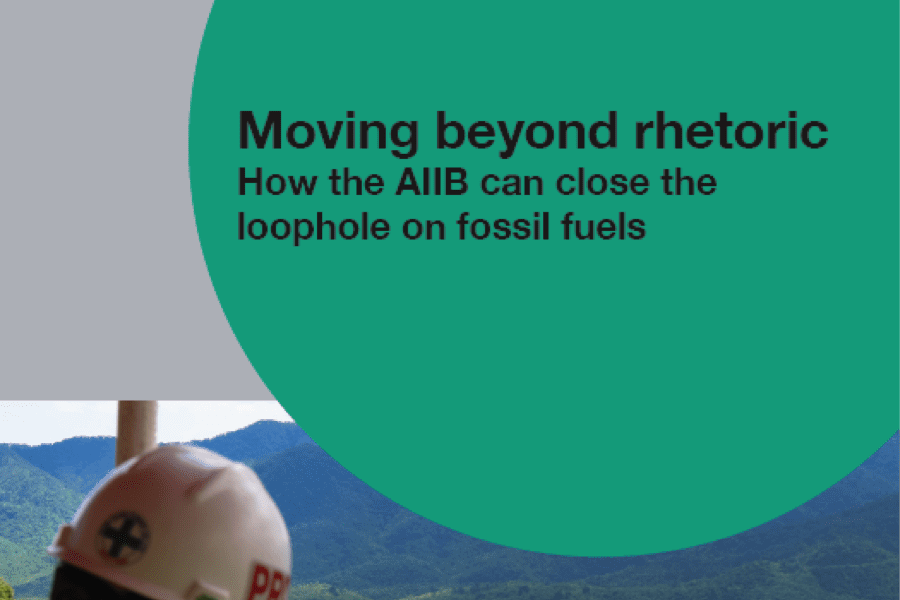(Mumbai) – The Asian Infrastructure Investment Bank (AIIB) has funded its first coal-burning project, despite repeated assurances from its senior directors that their “green” bank would steer clear of coal, according to a report released today by Bank Information Center Europe and Inclusive Development International.
The project will expand the Shwe Taung cement plant in Myanmar including by doubling the output of the coal mine that supplies the plant. The AIIB has bought into the IFC’s Emerging Asia Fund (EAF), which has invested $20m in the Shwe Taung plant.
The report, Moving Beyond Rhetoric, warns that the bank’s back-door investment in the Myanmar cement plant is a worrying sign that the AIIB will not stick to its green commitments as it prepares to invest $100 billion in new infrastructure projects in Asia and beyond.
The AIIB approved its $150m investment in EAF in September 2017, despite the fact that the EAF was considering the controversial $20m Shwe Taung deal at the time. Myanmar and international civil society groups warned both the AIIB and the IFC, which manages the fund, against the high-risk investment. Nonetheless, the EAF announced its investment in the plant in January 2018. This came despite the US voting against IFC involvement in the Shwe Taung plant because of the lack of data about its impact on local people and concerns over biodiversity impacts.
“It’s taken just two years for the AIIB to step into coal,” said Petra Kjell, Campaigns Manager of Bank Information Center Europe. “It is all the more disappointing because the AIIB went into this highly controversial deal with its eyes wide open.”
The AIIB holds its third AGM in Mumbai on June 25-26.
The majority of the world’s planned new coal-fired plants are located in Asia – a continent where greenhouse gas emissions grew by 3.6% per year from 2006-14, 3% more than the global average. The AIIB is focused on realizing Asia’s infrastructure demands, including for energy. Industrial processes, such as cement production, are a growing source of emissions, contributing over a fifth of direct global GHG emissions.
“The AIIB’s Shwe Taung deal via a ‘financial intermediary’ – in this case, the Emerging Asia Fund – uses a highly risky model in which money is funneled into controversial projects in a way that sidesteps environmental and social oversight by the bank,” said Natalie Bugalski, Legal Director of Inclusive Development International.
Local civil society in Myanmar has objected to the Shwe Taung expansion because it will cause more pollution, deforestation and environmental destruction. Local complainants have already been subject to “judicial harassment”, according to testimony.
AIIB and IFC officials have argued that the Shwe Taung deal does not involve coal for energy but instead for industrial processes, “but the world’s climate doesn’t distinguish between the two,” Kjell said.
The AIIB also has a stake via the EAF with the Singaporean company Summit Power International, which operates 13 power plants in Bangladesh, all of which run on fossil fuels such as heavy fuel oil and liquefied natural gas. Summit Power appears to have no renewable energy plants and it is currently building more fossil fuel plants in Bangladesh, including a plant in Meghnaghat. The IFC’s own investment in Summit Power is considered “high risk” because of issues such as concerns about land acquisition and pollution.
Moving Beyond Rhetoric says the AIIB has the chance to leapfrog its peers like the World Bank to more sustainable lending practices, since it was founded in the wake of the Paris Climate Agreement and is not lumbered with the high carbon infrastructure legacy of other development banks. The report acknowledges the AIIB has made moves in the right direction with some investments in renewable energy. AIIB President Jin Liqun said it would prioritise green deals and told the bank’s 2017 AGM “there are no coal projects in our pipeline”.
Despite these assurances and the bank’s green potential, the AIIB has not explicitly excluded, coal power projects from its future investments – unlike the World Bank, which has made a “no coal” commitment, except in exceptional circumstances.
“The AIIB already has a troubling proportion of projects that support gas and other fossil fuels in its portfolio.” Kjell said.
“It is time for the AIIB to move beyond rhetoric, and take concrete actions to deliver on its promises to promote a green, low-carbon future,” Bugalski said.
Bank Information Center Europe and Inclusive Development International say that the AIIB should stop financing oil and gas extraction and phase out remaining fossil fuel investment by 2020. It should put an immediate ban on financing coal for any purpose and insist that its future “financial intermediary” clients disclose publicly all their investments, so that AIIB’s green commitments can be monitored.
The report is available here.


